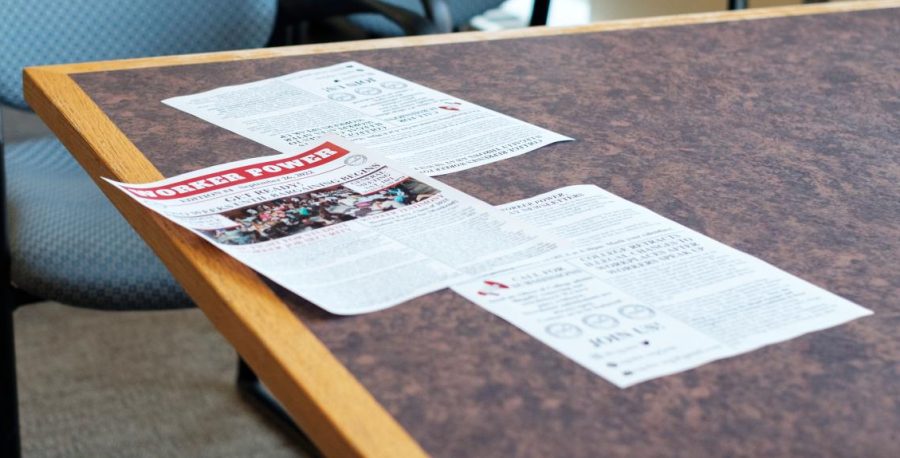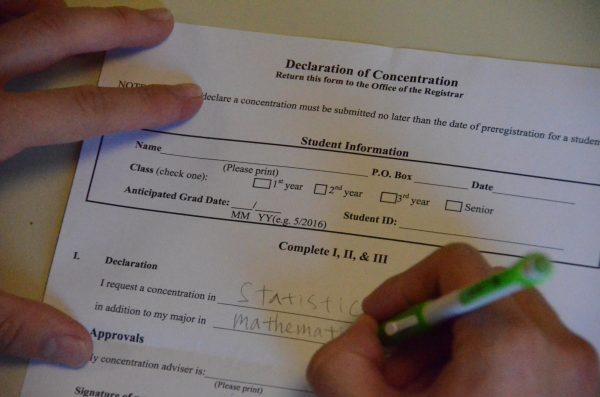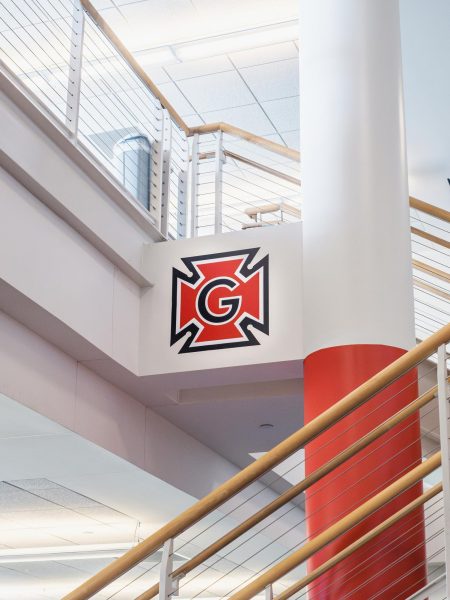College and UGSDW disagree about Union newsletter distribution practices
The Union of Grinnell Student Dining Workers has been distributing their weekly newsletter, Worker Power, since the first week of September 2022. The newsletters have been removed in what the Union has alleged is a violation of the National Labor Relations Act; the College has alleged the method of distribution of the newsletters violates both the College’s own Advertising/ Signs/Tabling Policy and the current 2021-23 collective bargaining agreement between UGSDW and the College.
October 3, 2022
The Union of Grinnell Student Dining Workers (UGSDW) has alleged that Grinnell College’s practice of removing UGSDW Worker Power newsletters from some campus spaces violates the National Labor Relations Act (NLRA). Yet, according to members of the College administration, the distribution of UGSDW newsletters not only violates the College’s Advertising/Signs/Tabling Policy, but also conflicts with the 2021-23 collective bargaining agreement between the College and UGSDW.
After a historic election last spring, where the Union expanded to include all hourly student workers, UGSDW began the 2022-23 academic year with a push to include as much input from student workers in collective bargaining negotiations as possible, which included distributing newsletters under the title Worker Power, according to former UGSDW President Keir Hichens `22.5
The distributed newsletters have been removed from tables in the Spencer Grill by non-student staff members. Mattia Wells, senior content strategist, cited both the current collective bargaining agreement and the College’s postering policy as reasoning for the removal of the newsletters.
In an email to the S&B, Wells wrote that during prior conversations between UGSDW and the College, both parties agreed to honor the 2021- 23 Collective Bargaining Agreement, which can be viewed online at UGSDW’s website. Wells listed Section 3.5, where the agreement reads: “The Union agrees it will not engage in general distribution, or posting by employees, of pamphlets, advertising or political matters.”
Hichens declined to comment on Wells’ allegation that the current bargaining agreement placed limits on UGSDW’s ability to distribute newsletters and that members of the administration did not mention the alleged violation of the collective bargaining agreement during their joint meetings in the past month. He said it was only brought up in an email to UGSDW after the meetings.
Hichens did comment, however, that the current contract only applies to student employees covered under the original contract, which includes student workers employed by Grinnell College Dining Services, rather than all student employees at the College.
Although the College recognized the Union’s newsletter distribution as inconsistent with Section 3.5 of the current collective bargaining agreement, Wells wrote that after multiple meetings with members of UGSDW, “College administration made the decision to remove only fliers that were posted in a manner inconsistent with the Advertising/ Signs/Tabling policy.”
The College’s poster policy states that, “Free postering is limited to College-owned residential spaces and in the JRC outside the dining hall … Any postings/flyers placed in areas outside of these designated locations (e.g., windows, doors … on tables/ desks) … will be removed by College staff.”
Wells wrote that the College’s “actions to date have allowed more posting access to the union than the contract stipulates.”
Hichens said he believes the College’s decision to remove the newsletters is based on the content of the newsletter, rather than the advertising policy.
In the Sept. 26 edition of the newsletter, the Union alleged that the practice of removing flyers violates Section 8(a)(1) of the National Labor Relations Act (NLRA), which sets federal standards for the rights of employees to organize into unions
and engage in collective bargaining. NLRA Section 8(a)(1) states that unfair labor practices by employers include interfering with, restraining or coercing employees in the exercise of rights guaranteed in Section 7 of the NLRA. Among other rights listed in that section, employees have the right to engage in “concerted activities for the purpose of collective bargaining or other mutual aid or protection.” According to the NLRB website, these rights include the right to distribute union literature.
“They don’t want student workers to read what is in these newsletters. They don’t want us to present a unified front and they don’t want people to get ready to take action,” Hichens said.
Wells wrote that “Grinnell College does not agree with the Union’s contention that these actions are in violation of Section 8(1)(a) of the National Labor Relations Act.”
Hichens also said that the removal of UGSDW newsletters but not print editions of the Scarlet & Black is a “blatantly discriminatory” practice that he thinks is based on content differences between the two publications.
Wells wrote that the S&B “is materially different from UGSDW” because the S&B is an officially recognized College newspaper and a recognized student organization.
Lena Wiebe `25 helped distribute Worker Power newsletters. She said she has held multiple campus jobs at the College, but only attended a couple of general UGSDW meetings last year. But as collective bargaining negotiations near, Wiebe said she became increasingly engaged with supporting UGSDW.
“I knew what the Union’s priorities were, and I knew that they lined up with mine,” she said. Over the past two weeks, Wiebe said she has helped to distribute Worker Power newsletters on Monday mornings.
On Monday, Sept. 26, UGSDW members printed about 1,000 copies of the newsletter which were distributed by 10 to 12 students, including Wiebe, according to Hichens.
According to Wiebe, early on Monday, Sept. 26, as she was distributing newsletters to tables in the Spencer Grill, a supervisor at the Grill told her that she was not allowed to distribute the newsletters.
Wiebe said the supervisor told her that students cannot distribute posters onto tables in the Spencer Grill. Wiebe said she responded by stating that she was not distributing posters, but newsletters that were union literature, and pointed out that other student materials — namely, the print edition of the S&B — had not been removed, despite being placed on the same tables.
Wiebe alleged that the supervisor responded that UGSDW newsletters were different from the S&B print edition and that the S&B newspapers did not have an agenda.
Wiebe said she continued to distribute the newsletters anyway. Throughout Monday, Wiebe alleged that supervisors and members of the College administration continued to remove newsletters from the Grill.
“We’ve gone in and replaced them, like five separate times,” Weibe said. “This has happened in various places throughout campus.”
Hichens said that though UGSDW is considering contacting the NLRB about the alleged violation of Section 8(a)(1), he said he thinks the NLRB can take a long time to process charges of unfair labor practices and the Union’s priorities are currently to focus on collective bargaining.
“So, we’re thinking about it, but the most important thing is getting membership up to date, our bargaining priorities, getting feedback on our proposals and making sure that we’re ready to come to the table to bargain in good faith with the College and win a strong contract,” said Hichens.
Editor’s Note: As student workers, all staff members of the S&B will be included in future collective bargaining. The S&B remains an independent newspaper and is committed to maintaining its integrity in reporting.







































































